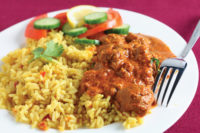Culinary Collection
MO-based Willow Brook Foods’ array of meat and poultry further-processed products is designed to offer a variety of options.
Conventional wisdom may advise against trying to be all things to all people, especially concerning a mix of products— but those in charge of affairs for Springfield, MO-based Willow Brook Foods don’t buy it. This vertically integrated protein business on the turkey side promises a product “to fit any need and every appetite” with a line ranging from “succulent” roasted chicken, distinctive roasted or smoked turkey breasts, herb-seasoned pork roast, Old World sausages, and “extraordinary” varieties of ham.
“The key strategy that allowed us to be where we are today is the diversity that we have built in our product mix,” Mike Briggs, president, confirms. “Although most people think of us as a vertically integrated turkey company, thirty-five percent of our sales are proteins other than turkey. The hidden assets of our company are the breadth of our customer base and the diversity of our manufacturing capabilities, along with the customer orientation of our management and employees.”
Willow Brook Foods evolved after a 2002 buyout transferring ownership to its current group of investors. The new company operates as the 15th largest turkey processor in the United States and the 59th largest meat and poultry processor. As a fully integrated turkey enterprise, Willow Brook controls breeding, hatching, feeding, growing, and harvesting of turkeys to ensure the availability of “superior raw material and a more consistent supply.”
It generates more than $225 million in annual sales with more than 1,500 employees and three processing facilities in Springfield, MO, and one in Albert Lea, MN. The company expects to accelerate growth, thanks to the recent addition of a new underground slicing facility.
“We are looking forward to the opportunities our new slicing facility will bring,” Rich Mende, executive vice president, further processed sales and marketing, acknowledges. “We feel this capability is key to growing with the needs of our customers.”
In addition to his meat-industry experience, Mende also held management positions in the retail food store arena.
Notably, Albert Lea is the production home for the company’s Schweigert branded Old World sausage, distributed throughout states in the upper Midwest region.
“Our Schweigert branded business has been a staple for sixty-eight years,” Mende notes.
Springfield, also Willow Brook’s corporate site, is home to its production facilities for raw- and cooked-turkey products, supported by hatcheries, feed mill, and turkey grow-out facilities. The site also includes a primary distribution center. Albert Lea is dedicated to portion control chicken products, sausage, and lunchmeat.
About 40 percent of Albert Lea products are delivered to foodservice and supermarket service deli customers from the company’s Underground Distribution Center in Springfield.
Overall, product distribution reaches 49 U.S. states and international sales target the Far East, Mexico, and Europe.
Last year, Willow Brook introduced a new line of “good-for-you” oriented turkey, ham, chicken, and beef products under the Lifestyle Premium Deli brand.
“Obviously we are pretty excited about our Lifestyle brand and its focus on positive nutrition,” Tom Collins, director of marketing, says. “As the American demographics reflect an aging population, we believe that though the fad may change, nutrition as a means of achieving a full life is a market driver.”
The Lifestyle line offers other benefits, including distinctive packaging, informative labels, point-of-sale impact, and proven formulations. “These products are ideal for all consumers, even those not on a diet,” Collins emphasizes. “They also perform well in deli and foodservice applications.”
Thanks to the Lifestyle and other initiatives, Willow Brook ended its 2004 fiscal year in good stead. “We had record sales,” Steve Foucart, chief financial officer, reports. “We also have good sales momentum with our Lifestyle Premium Deli brand bulk meats and slicing launches going into the New Year. We are [currently] ahead of budget and believe this year will be a really good year for us.”
A company’s past life may offer insight into its future. The business DNA of Willow Brook Foods includes links to Hudson Foods and Tyson Foods, both Arkansas firms. Tyson acquired the Hudson Foods business in a September 1998 merger. Tyson later sold the subsidiary. Willow Brook Foods’ current ownership includes members of management and an investment group comprised of Powell & Powell Milling and Springfield Underground Inc.
“Our current ownership arrangement is designed to position the business for future growth,” Briggs says.
“This is a great structure because each of the investors has a strategic interest in the company.”
MO-based Springfield Underground Inc. owns and operates an underground industrial complex in which Willow Brook Foods’ distribution center and new slicing facility are located. Powell & Powell Milling operates feed milling and turkey production businesses in northwest Arkansas.
Although product diversity is a strength for Willow Brook Foods, there is another goal in its operating strategy, as Briggs explains. Managing available capital to enable the company to maximize its ability to compete is a critical issue. “Our diversity has gotten us where we are,” he acknowledges.
He knows, however, that alone will not keep the company on a growth track. “There are midsized food companies like ours that struggle with the same ideas of how to deal with such issues as customer consolidation, while also competing with larger companies,” Briggs pinpoints.
The solution lies in staying “nimble” and “entrepreneurial” while remaining on message and strategy, he says.
One way to do this is to develop business solutions for customers designed to help them grow sales and profits.
“We believe our future is dependent upon our success in foodservice, and we are committed to growing that segment of our business,” he says. “As this happens, Albert Lea and Springfield will become more integrated as the production capability matches up to the sales and distribution capabilities.”
To that end, Briggs says, his company’s investment in sales initiatives coupled with research and development programs is extensive. “Strategically we have attempted to leverage our strong position as a supplier of deli turkey products by marketing innovative programs such as Old World sausage, flavored Chicken wings, and Lifestyle Premium Deli meats to grow our customers’ businesses,” he explains.
He is not unmindful of how market forces can impact even the best of strategies, however. Asked to identify such challenges confronting Willow Brook’s business, he quips, “What hasn’t? You name it, volatility in energy and feed stuff markets; consolidation of customers; Listeria directive; zero tolerance, on-farm rules; Russian and Mexican trade issues; and, the usual over/under supply.”
Even so, he relishes company milestones and plans to use his leadership position to help the Willow Brook team push forward.
“This may sound funny, but I think this year will be looked upon as the year Willow Brook Foods came of age,” a circumspective Briggs says. “Until now, we have had so many things happen to us that it was hard to think about anything but dealing with what was in front of us. I think with the stability of new ownership, we are focusing on what we need to do to grow the business — not only for the short term, but the long term as well.” NP


Report Abusive Comment